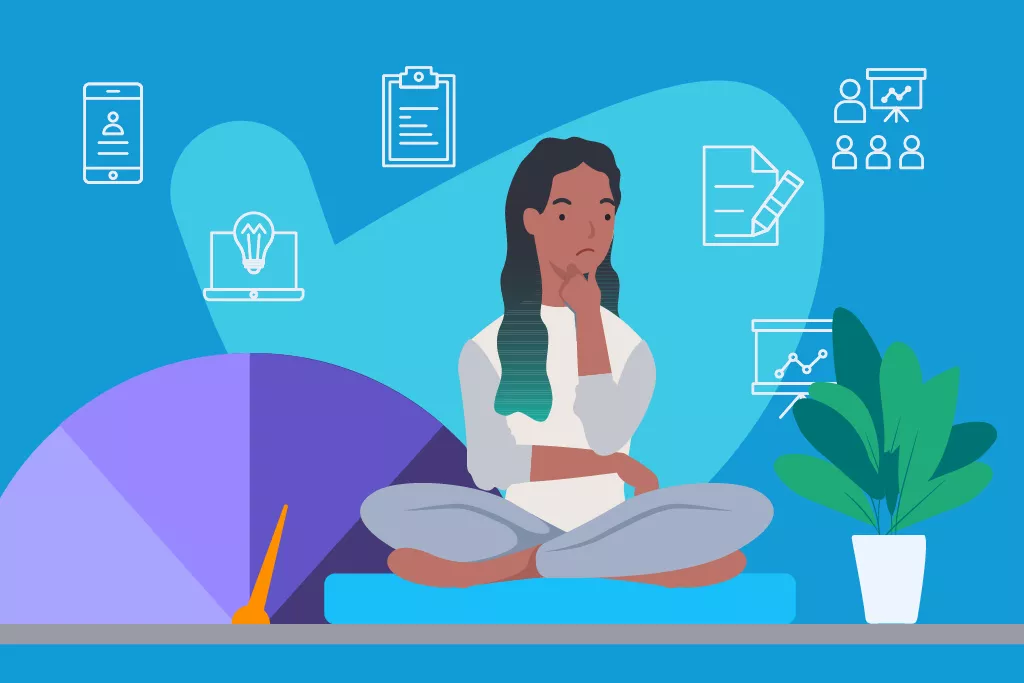HR training, delivered seamlessly online for busy professionals
According to research from the Mental Health Foundation, 74% of UK adults have reported feeling so stressed over the last year that they couldn’t cope. That research also found that 65% of adults have felt more stressed since COVID-19 restrictions began. To increase awareness of those staggering statistics, Stress Awareness Month kicks off on 1 April. Its aim is to highlight the fact that stress is a public health crisis, and it’s one that we don’t pay enough attention to.
The theme of this year’s Stress Awareness Month is Regaining Connectivity, Certainty and Control. Everyone has busy lives juggling multiple things, like learning, work and family time, but it’s important to think about what you can do to make positive behavioural changes and better manage your stress. We’ve rounded up eight things you can do to build a time management plan, get a better handle on your schedule, and hopefully reduce your overall stress.
Prioritise and sort your tasks
Before you start working on anything, group your tasks into four categories:
- urgent and important
- not urgent, but still important
- urgent, but not important
- not urgent and not important
You can identify urgent tasks as ones that have to be done right away to avoid a bigger problem, like paying your bills. Important tasks are ones that having meaning to you, like spending time with friends and family and exercising. Not important tasks are things you need to do, but don’t really matter in the long run.
After you’ve sorted your tasks, focus on activities that are not urgent but still important. If you can allocate time to those, you can keep them from crossing into the urgent category. That’s the most important bit, because if you have less urgent tasks, you’ll be less overwhelmed. Also, think about redirecting your time to the activities that are important to you, and the things that reflect your values and priorities.
Map everything out
If you find yourself suddenly realising it’s 4 p.m., and you’re not sure where the day went, you’re not alone. It’s a super common time management problem, and so many of us overestimate the amount of time we have and underestimate how long it’s going to take us to do something. To mitigate that, put together a careful schedule for yourself, and write down everything you need to do, and how long each task will take based on how long similar tasks have taken you in the past. Take on a “one in, one out” system and don’t add anything new to your list until you’ve completed one thing that’s already on it.
Limit procrastination
The less you want to do something, the more likely you are to avoid it. That can add up to stress, so reduce your procrastination by:
- keeping lists and sticking to them
- breaking up bigger tasks in to more manageable, smaller ones
- set timers to help you stick to your schedule
- set shorter-term deadlines
- avoid perfectionism, and just do your best to get the task done
If you find yourself slipping back into procrastination, try not to be too hard on yourself. It’s easy to get distracted, and maybe you need some time to reset (more on that later).
Be realistic with your time, and don’t be afraid to say no
Sometimes, letting something go isn’t a bad thing. You need to focus on what’s important to you and your own development, and recognise that you can’t do everything. People who experience a lot of stress tend to over promise, take on too many things and rarely say no. Be realistic about what you have time to do, and if you truly do not have the energy or space to commit to something, don’t be afraid to say no.
Don’t be afraid to delegate
Can’t say no, but don’t have time? Be prepared to delegate. If you know something you’ve been asked to do is someone else’s responsibility, pass it along to them. If you have a support system, either in your personal or professional life, share the responsibilities among those people who are able and willing to help you out. You might want complete control over a task, but it’s important to understand that the stress of a snowballing to-do list might not be worth it.
Focus on results
Again, allowing something to fall off your to-do list isn’t always a bad thing. If you have good time management skills, that typically means you’re producing high-quality work, not necessarily a huge amount of work. Rather than focusing on your busy you are, focus on your results. If you’ve only done two or three things that day, but you’ve done them all very well, that’s a win, and you can tackle your other tasks tomorrow.
Take breaks
Breaks are super important, and missing out on them can be counter-productive. Taking just 30 minutes away from your desk can help you reset, and be more effective when you come back. Go for a walk, have a snack, or spend time with your family, and work that break into your schedule so you can’t miss it. Along with regular breaks during the week, take larger breaks in the way of holidays, too. Again, you need time away to reset, refresh, and come back to your work and daily tasks better prepared for success.
Plan to unwind at the end of the day
Much like taking breaks and time off, having a plan to let yourself reset at the end of each day and give your brain a break is so important. It’s extra important right now as many of us are still working from home. Whether you unwind through time with your family, time to exercise, or time to yourself, give yourself a hard stop at the end of the day, stick to it, and take a complete break from everything on your to-do list.
About Avado
At Avado, we believe that true transformation isn’t digital, it’s human. We build professional future skills to help diverse talent access and accelerate careers through award-winning learning experiences that deliver tangible and measurable impact. We upskill people, uplift culture and future-proof organisations in a fast-moving world.
Avado is proud to be a people-transformation partner to some of the largest and most innovative organisations in the UK including: Google, BT, NHS, British Airways, UK Civil Service, Legal & General and AstraZeneca.
To find out more, visit www.avadolearning.com
 6 min read
6 min read 



